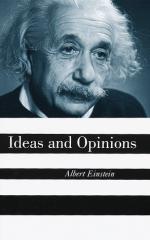
|
| Name: _________________________ | Period: ___________________ |
This test consists of 15 multiple choice questions and 5 short answer questions.
Multiple Choice Questions
1. How does Einstein characterize the women of America?
(a) As cyphers.
(b) As intellectually inferior.
(c) As rejecting advances.
(d) As a millstone around the necks of their husbands.
2. Unless all nations band together to face aggressors, what is inevitable?
(a) Capitulation of pacific nations.
(b) Universal domination and subjugation.
(c) Triumph of evil.
(d) Universal anarchy and terror.
3. With what does religion deal?
(a) The truthof scientific theories.
(b) Everything not predetermined by heredity, sets ideals, and educates.
(c) The morality of science.
(d) The need for progress.
4. What does Einstein admire about Mahatma Ghandi?
(a) His intellect.
(b) The way he treated his wife.
(c) His method of non-cooperation.
(d) His vegetarian diet.
5. How does Einstein characterize people who read only newspapers and modern literature?
(a) Mentally frail.
(b) Myopic and snobbish.
(c) Undereducated.
(d) Wise.
6. Though science can produce knowledge and means of action, what can it not do?
(a) Set goals or pass value judgments.
(b) Stop thinking that arises from myth.
(c) Initiate that action.
(d) Produce truth.
7. What is pacifism that fails to fight against armaments?
(a) Impotent.
(b) Insane.
(c) Effective.
(d) Wise.
8. What puzzles Einstein about one aspect of the American economy?
(a) The fact that paper money is not backed by gold and silver.
(b) The lack of a savings plan.
(c) The high tariffs on foreign goods.
(d) That the cost of labor is so high in comparison to goods produced.
9. What makes life easier but also brings economic dangers that planning must address?
(a) Mass production.
(b) Science and technology.
(c) Labor laws.
(d) Labor unions.
10. Who does Einstein think is partly to blame for Europe's condition?
(a) The indecisiveness of its leaders.
(b) The arrogance of its leaders.
(c) The United States.
(d) The agressiveness of its policies.
11. How could unilateral disarmament be negotiated?
(a) Through enforcement of the League of Nations.
(b) Through arbitration.
(c) Einstein is not certain about that point.
(d) Through laws in a world court.
12. What does Einstein warn the Progressive Education Association?
(a) That education is worthless without morality.
(b) That progress without deliberation leads to becoming mired in legality.
(c) That progress without intention is disasterous.
(d) That teaching pacifism without spurning militarism is unrealistic.
13. With the family eroding, society depends on the schools for what?
(a) To supervise activities rather than learning.
(b) To teach morals.
(c) Not to transfer a maximum quantity of knowledge to students, but to help them think and act independently.
(d) To instill purpose in the students.
14. What should history do?
(a) Interpret the progress in civilization rather than calculating power and success.
(b) Be forgotten.
(c) Influence the future.
(d) Teach the future.
15. What does Einstein say about the League of Nations' Committee of Intellectual Cooperation?
(a) It may eventually prove to be valuable.
(b) It at least embodies the principle that "something must be done."
(c) It is full of hot air.
(d) Its members are facists at best.
Short Answer Questions
1. Though one man choosing to be a conscientious objector would accomplish little, what would accomplish much?
2. What is valued more in Europe than in the United States?
3. By what ideals has Einstein lived?
4. Why does Einstein think humans act and think?
5. "On Academic Freedom" (1931) defends whom?
|
This section contains 564 words (approx. 2 pages at 300 words per page) |

|




